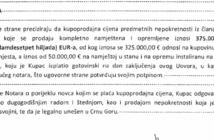State’s Investment Development Fund (IDF) refused to submit to the Network for Affirmation of NGO Sector (MANS) loan agreement worth million and half Euros given to the company BB Hidro whose co-owner is Blažo Đukanović, son of Milo Đukanović, the President of the state and DPS,. When denying request, IDF referred to an Article of the Law on Free Access to Information and provision prescribing trade secret. IDF approved loan to BB Hidro through Hipotekarna Banka.
– Provisions of Article 14, Paragraph 6 of the Law on Free Access to Information, stipulate that access to information may be restricted if the information is trade or tax secret in accordance with the law. In this regard, while considering specific request pursuant to Article 16, paragraph 1, IDF conducted a harm test for disclosing the requested information, assessing that in the specific case, issuing of the requested contract with the accompanying documentation would have adverse consequences for the commercial and other economic interests of the contracting parties, which, according to the Fund’s assessment, is of greater importance than the interest of providing this information – IDF’s decision, submitted to MANS, reads.
MANS, who submitted IDF’s decision to “Dan”, said that, according to the Fund’s assessment, commercial and economic interests of the contracting parties, i.e. company BB Hidro and IRF of greater importance than the public interest.
– At the same time, the Fund did not consider the interest of the public to have access to information on the state loan given to the company of the son of the highest state official – MANS pointed out.
In addition to the loan of the company BB Hidro, IDF, headed by Zoran Vukčević, one of the actors of the affair “Snimak”, also declared trade secret the basic data on controlling the use of loans from the Abu Dhabi fund on the basis of its own Rulebook, the day before the prosecution began to question the spending of that money. Even information on the number of conducted controls of the use of loans were declared trade secret, as well as the reports made on this basis.
– IDF declared trade secret statistical information on loan control, stating that it is prescribed by the Banking Law, the Law on Financial Leasing, Factoring, Purchase of Receivables, Microcredit and Credit-Guarantee Operations, as well as the Law on Protection of Unpublished Data. The Fund claims that the requested information is secret and in accordance with their statute and rules on trade secret, as well as the loan agreements concluded with the companies. Finally, IDF states that the publication of the requested information would compromise market competition, cause adverse consequences for the commercial and other economic interests of the contracting parties, which was allegedly established by the harm test – MANS stated for “Dan”.
IDF submitted such response to MANS on April 10, the day before the media reported that the Special Prosecutor’s Office was investigating the use of funds from the Abu Dhabi Fund for suspected abuses.
– The first two laws do not prescribe in any article that statistical data can be classified as secret, while the Law on Protection of Unpublished Data relates to the protection of intellectual property. On the other hand, the Statute and the IDF Rulebook are bylaws, and the requirement that the data be declared trade secret is that it is prescribed by a specific legal provision. Otherwise, the rules on trade secrets are not publicly available. IDF claims that it conducted a harm test, however, in its decision, it did not explain at all how the publication of control statistics could jeopardize any interests – MANS stated.
Liability of IDF for the Abu Dhabi Fund to be determined
According to MANS, IDF is one of the least transparent institutions in the state, which almost on a daily basis violates the Law on Free Access to Information by declaring even basic information about its work trade secret or confidential information.
The case of concealing information about loans from the Abu Dhabi Fund is a textbook example that the information that can point to law violations or possible corruption is precisely the one declared trade secret. We believe that, after the competent State Prosecutor’s Office opened an investigation into these loans, it is of undisputed public interest to find out what kind of control was carried out by the IDF and the extent to which they were responsible for possible embezzlement, the NGO stated.
Secret according to the pattern
In its decision on Abu Dhabi fund, IDF did not consider the public interest in disclosing information, especially bearing in mind it could point to corruption. This is also evidenced by the fact that the State Prosecutor’s Office launched an investigation in connection with the improper spending of these funds, MANS stated.
This Fund responded in the same manner to the request to publish control reports, although in the first case it is only about a number and in the second a much more detailed document, while disclosing of a different type of information cannot have the same impact on the protected interest. Thus, IDF apparently did not conduct an adequate harm test, nor did it conduct a public interest test, but had already taken a stance that data on the use of funds from the Abu Dhabi fund should be declared trade secret – according to MANS.
IDF also declared trade basic information on controlling the use of loan from the Abu Dhabi Fund, the day before it was announced that the Special State Prosecutor’s Office launched preliminary proceedings.



